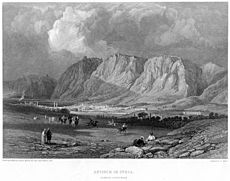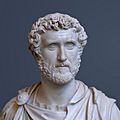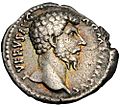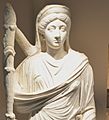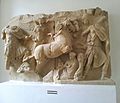Lucius Verus facts for kids
Quick facts for kids Lucius Verus |
|||||
|---|---|---|---|---|---|
| Emperor of the Roman Empire | |||||
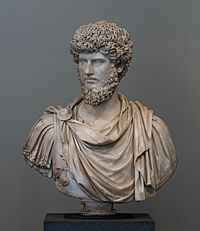
Bust of Lucius Verus
|
|||||
| Reign | 8 March 161 - 169 (with Marcus Aurelius) |
||||
| Predecessor | Antoninus Pius | ||||
| Successor | Marcus Aurelius (alone) | ||||
| Born | 15 December 130 | ||||
| Died | 169 (aged 39) Rome |
||||
| Burial | Hadrian's Mausoleum | ||||
| Wife |
|
||||
| Issue | daughter Aurelia Lucilla, son Lucius Verus and daughter Plautia, all died young | ||||
|
|||||
| Dynasty | Antonine | ||||
| Father | Lucius Aelius (natural); Antoninus Pius (adoptive, from February 138) | ||||
| Mother | Avidia Plautia | ||||
Lucius Verus (born Lucius Ceionius Commodus, 15 December 130 – 169 AD) was a Roman co-emperor with Marcus Aurelius. They ruled together from 161 AD until Lucius Verus's death in 169 AD. He was the junior partner to the famous Marcus Aurelius.
Contents
Early Life and Political Start
When Lucius Verus's father died in 138 AD, Emperor Hadrian chose Antoninus Pius to be his successor. Hadrian made a special condition: Antoninus had to adopt both Lucius Verus and Hadrian’s great-nephew Marcus Aurelius as his own sons and future heirs.
Lucius Verus began his political journey as a quaestor in 153 AD. A quaestor was an important financial official in the Roman government. He then became a consul in 154 AD. A consul was one of the two highest-ranking elected officials in the Roman Republic and Empire. He served as consul again in 161 AD, this time with Marcus Aurelius.
Becoming Emperor
Two Emperors: Lucius and Marcus, 161 AD
Antoninus Pius died on March 7, 161 AD. Marcus Aurelius was expected to become the sole emperor. However, Marcus Aurelius refused to take the job unless Lucius Verus received equal power. The Roman Senate agreed to this unusual request.
This was the first time Rome was ruled by two emperors at the same time. Even though they were officially equal, Marcus Aurelius had more authority. He had been a consul more times than Lucius. He also had more experience working with the previous emperor, Antoninus Pius. Marcus Aurelius was also the Pontifex Maximus, which was the chief priest of Rome. This made it clear to everyone who was the more senior emperor.
After being confirmed by the Senate, both emperors went to the camp of the Praetorian Guard. This was a special group of soldiers who protected the emperor. Lucius Verus spoke to the troops, and they cheered for both emperors. Like other emperors before them, Lucius promised the soldiers a special payment. This helped ensure the army's loyalty.
War with Parthia (161–166 AD)
A major war with the Parthian Empire began right after Antoninus Pius died. The Parthian Empire was a powerful rival to Rome in the East.
Lucius Goes East (162–163 AD)
As bad news arrived from the East, including a rebellion in Syria, it was decided that Lucius Verus should lead the war against Parthia in person. People thought he was stronger and healthier than Marcus Aurelius, making him more suitable for military command. The Senate agreed, and Lucius left Rome. Marcus Aurelius stayed in Rome, as the city needed an emperor's presence.
Lucius was joined by important officials and part of the Praetorian Guard. He traveled east by ship from Brundisium. Marcus Aurelius went with him as far as Capua. Lucius enjoyed himself along the way, visiting country houses and hunting. He fell ill at Canosa, possibly from a mild stroke. Marcus Aurelius prayed for him and rushed to see him.
Lucius continued his journey through Corinth and Athens. He traveled with musicians and singers, almost like a royal parade. It's not known exactly how long his journey took, but he might not have reached Antioch until after 162 AD.
Life in Antioch (162–165 AD)
Lucius Verus spent most of the war campaign in Antioch, a major city in Syria. He would stay in Laodicea during winter and at Daphne, a resort near Antioch, in the summer. He had a girlfriend named Panthea, who was described as very beautiful and talented.
Lucius faced a big challenge because the Roman army in Syria had become too relaxed during a long period of peace. Soldiers spent more time in city cafes than training. Under Lucius, training became much stricter. Gambling and drinking were closely watched. It was said that Lucius often walked at the front of his army, not just rode on horseback. He personally checked on soldiers in the field, in camp, and even in the sick bay.
During the war, around 163 or 164 AD, Lucius traveled to Ephesus to marry Marcus Aurelius's daughter, Lucilla. Lucilla was not yet fifteen years old. Marcus Aurelius may have wanted the marriage to happen sooner, perhaps because of stories about Panthea. Lucilla would later have three children with Lucius.
Roman Victory (163–166 AD)
Roman legions achieved success in Armenia in 163 AD, capturing the Armenian capital, Artaxata. Lucius Verus was given the title Armeniacus (meaning "victor in Armenia"), even though he hadn't fought in the battle himself. Marcus Aurelius waited to accept the title until the next year.
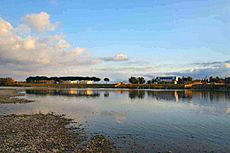
Armenia was reorganized under Roman control. A new king, Sohaemus, who was a Roman senator, was placed on the throne. Roman coins from 164 AD showed Lucius Verus on a throne with Sohaemus standing before him, saluting the emperor.
In 163 AD, the Parthians invaded Osroene, a Roman client state in Mesopotamia. They removed its ruler and put their own choice in power. In response, Roman forces moved to cross the Euphrates river further south. By the end of the year, Roman forces had taken control of areas on the northern, Parthian side of the Euphrates. Other Roman forces moved into Osroene from Armenia.
In 165 AD, Roman forces entered Mesopotamia. They recaptured Edessa and put Mannus back in charge. The Parthians retreated to Nisibis, but this city was also captured by the Romans. Another Roman force, led by Avidius Cassius, moved down the Euphrates and fought a major battle at Dura.
By the end of 165 AD, Cassius's army reached the important cities of Seleucia and Ctesiphon on the Tigris river. Ctesiphon was captured and its royal palace was burned. The people of Seleucia, who were mostly Greek, opened their city gates to the Romans. However, the city was still sacked, which damaged Lucius's reputation. The official story was that the Seleucians had broken their agreement first.
Cassius's army returned to Roman territory safely, even though they faced a shortage of supplies and a plague they caught in Seleucia. Lucius Verus was given the title Parthicus Maximus (meaning "greatest victor over the Parthians"). Both he and Marcus Aurelius were honored as imperatores (military commanders).
In 166 AD, Cassius's army crossed the Tigris river into Medea. Lucius took the title 'Medicus' (meaning "victor in Media"). Most of the credit for the war's success went to the skilled Roman generals who served under Lucius.
When Lucius Verus returned to Rome, he was given a triumph. This was a grand parade to celebrate a military victory. The parade was special because it included Lucius, Marcus Aurelius, their sons, and unmarried daughters. It was a big family celebration. Marcus Aurelius's two young sons, Commodus and Annius Verus, were given the title of Caesar during the event. This meant they were recognized as future emperors.
Wars on the Danube and Death
In the spring of 168 AD, a new war began on the Danube border. The Marcomanni, a Germanic tribe, invaded Roman territory. This war would last until 180 AD, but Lucius Verus did not live to see its end.
In 168 AD, as Lucius Verus and Marcus Aurelius were returning to Rome from the war front, Lucius Verus became very ill. He died a few days later in 169 AD, at the age of 39. At the time, people thought he died from food poisoning. However, many historians now believe he was a victim of smallpox. This disease was part of a widespread epidemic known as the Antonine Plague that affected the Roman Empire.
Despite any small differences they had, Marcus Aurelius was deeply saddened by the loss of his adoptive brother. He brought Lucius's body back to Rome and held games to honor his memory.
Images for kids
-
Denarius of Lucius Verus. Inscription: L. VERVS AVG. ARMENIACVS.
-
Ancient Roman bust of Lucius Verus as a young man, in the Collection of Greek and Roman Antiquities in the Kunsthistorisches Museum, Vienna
-
Colossal head of Lucius Verus (mounted on a modern bust), from a villa belonging to him in Acqua Traversa near Rome, between 180 and 183 AD, Louvre Museum, Paris
-
Busts of the co-emperors Marcus Aurelius (left) and Lucius Verus (right), British Museum
-
Statue of Lucius Verus on a body modelled after a sculpture by the ancient Athenian sculptor Myron, Vatican Museums
-
Lucilla depicted as Ceres
-
The apotheosis of Lucius Verus, 2nd century relief plates from Ephesus, on display at Humboldt University of Berlin
-
Ancient bust of Lucius Verus in the Bardo National Museum, Tunis, 2nd century AD
-
Portrait head of Lucius Verus, found in Athens (National Archaeological Museum of Athens). He used to sprinkle gold-dust on his blond hair to make it brighter.
See also
 In Spanish: Lucio Vero para niños
In Spanish: Lucio Vero para niños
 | Shirley Ann Jackson |
 | Garett Morgan |
 | J. Ernest Wilkins Jr. |
 | Elijah McCoy |


